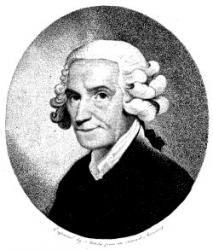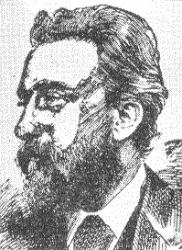Planning worship?
Check out our sister site, ZeteoSearch.org,
for 20+ additional resources related to your search.
- |
User Links
Person Results
John Goss

1800 - 1880 Person Name: J. Goss Composer of "[Christ our Passover is sacrificed for us]" in The Hymnal of the Protestant Episcopal Church in the United States of America 1940 John Goss (b. Fareham, Hampshire, England, 1800; d. London, England, 1880). As a boy Goss was a chorister at the Chapel Royal and later sang in the opera chorus of the Covent Garden Theater. He was a professor of music at the Royal Academy of Music (1827-1874) and organist of St. Paul Cathedral, London (1838-1872); in both positions he exerted significant influence on the reform of British cathedral music. Goss published Parochial Psalmody (1826) and Chants, Ancient and Modern (1841); he edited William Mercer's Church Psalter and Hymn Book (1854). With James Turle he published a two-volume collection of anthems and Anglican service music (1854).
Bert Polman
John Goss
William Henry Monk

1823 - 1889 Person Name: Monk Composer of "[Christ our Passover is sacrificed for us]" in The Hymnal William H. Monk (b. Brompton, London, England, 1823; d. London, 1889) is best known for his music editing of Hymns Ancient and Modern (1861, 1868; 1875, and 1889 editions). He also adapted music from plainsong and added accompaniments for Introits for Use Throughout the Year, a book issued with that famous hymnal. Beginning in his teenage years, Monk held a number of musical positions. He became choirmaster at King's College in London in 1847 and was organist and choirmaster at St. Matthias, Stoke Newington, from 1852 to 1889, where he was influenced by the Oxford Movement. At St. Matthias, Monk also began daily choral services with the choir leading the congregation in music chosen according to the church year, including psalms chanted to plainsong. He composed over fifty hymn tunes and edited The Scottish Hymnal (1872 edition) and Wordsworth's Hymns for the Holy Year (1862) as well as the periodical Parish Choir (1840-1851).
Bert Polman
William Henry Monk
John Stainer

1840 - 1901 Person Name: John Stainer, 1840-1901 Composer of "[Christ our Passover is sacrificed for us]" in The Hymnal 1982
John Stainer
Joseph Barnby

1838 - 1896 Person Name: Joseph Barnby (1838-1896) Composer of "EASTER CHANT" in Hymns for the Living Age Joseph Barnby (b. York, England, 1838; d. London, England, 1896) An accomplished and popular choral director in England, Barby showed his musical genius early: he was an organist and choirmaster at the age of twelve. He became organist at St. Andrews, Wells Street, London, where he developed an outstanding choral program (at times nicknamed "the Sunday Opera"). Barnby introduced annual performances of J. S. Bach's St. John Passion in St. Anne's, Soho, and directed the first performance in an English church of the St. Matthew Passion. He was also active in regional music festivals, conducted the Royal Choral Society, and composed and edited music (mainly for Novello and Company). In 1892 he was knighted by Queen Victoria. His compositions include many anthems and service music for the Anglican liturgy, as well as 246 hymn tunes (published posthumously in 1897). He edited four hymnals, including The Hymnary (1872) and The Congregational Sunday School Hymnal (1891), and coedited The Cathedral Psalter (1873).
Bert Polman
Joseph Barnby
Norman Mealy
1923 - 1987 Person Name: Norman Mealy, b. 1923 Adapter of "[Alleluia. Christ our Passover has been sacrificed for us]" in The Hymnal 1982
Norman Mealy
James Nares

1715 - 1783 Person Name: James Nares, 1715-1783 Composer of "[Christ our Passover is sacrificed for us]" in The Hymnal 1982 Born: April 19, 1715, Stanwell, Middlesex, England.
Died: February 10, 1783.
Buried: St. Margaret’s, Westminster, England.
After his family moved to Oxford, Nares became a chorister in the Chapel Royal. He later became deputy organist at St. George’s Chapel, Windsor; organist in York Cathedral (1734); and organist in the Royal Chapel and composer to the king (1756). He received a doctorate of music degree from Cambridge University in 1756. In 1770, the Catch Club awarded him a prize for his glee To All Lovers of Harmony.
Sources:
Frost, p. 683
Nutter, p. 462
http://www.hymntime.com/tch/bio/n/a/r/nares_j.htm
====================
http://en.wikipedia.org/wiki/James_Nares
James Nares
Bruce E. Ford
b. 1947 Person Name: Bruce E. Ford, b. 1947 Adapter of "[Christ our Passover is sacrificed for us]" in The Hymnal 1982
Bruce E. Ford
Henry Robert Gadsby

1842 - 1907 Person Name: H. Gadsby Arranger of "[Christ our Passover is sacrificed for us] (Gadsby)" in The Church Hymnal Born: December 15, 1840, Hackney, England. Though many sources show his birth year as 1842, census entries indicate an 1840 birth.
Died: November 11, 1907, Putney, England.
Buried: Putney Vale Cemetery.
Gadsby was a chorister at St. Paul’s Cathedral (1849-58), and organist at St. Peter’s, Brockley, until 1884, when he succeeded John Hullah at Queen’s College, Harley Street, London. In 1880, he became a professor at the Guildhall School of Music.
www.hymntime.com/tch/
Henry Robert Gadsby
David Hurd
b. 1950 Person Name: David Hurd, b. 1950 Adapter of "[Christ our Passover has been sacrificed for us]" in The Hymnal 1982 David Hurd (b. Brooklyn, New York, 1950) was a boy soprano at St. Gabriel's Church in Hollis, Long Island, New York. Educated at Oberlin College and the University of North Carolina, he has been professor of church music and organist at General Theological Seminary in New York since 1976. In 1985 he also became director of music for All Saints Episcopal Church, New York. Hurd is an outstanding recitalist and improvisor and a composer of organ, choral, and instrumental music. In 1987 David Hurd was awarded the degree of Doctor of Music, honoris causa, by the Berkeley Divinity School at Yale. The following year he received honorary doctorates from the Church Divinity School of the Pacific, Berkeley, California, and from Seabury-Western Theological Seminary, Evanston, Illinois. His I Sing As I Arise Today, the collected hymn tunes of David Hurd, was published in 2010.
Bert Polman and Emily Brink
David Hurd
Richard Farrant
1525 - 1580 Person Name: Farrant Composer of "[Christ our Passover is sacrificed for us]" in The Hymnal, Revised and Enlarged, as adopted by the General Convention of the Protestant Episcopal Church in the United States of America in the year of our Lord 1892 Like many composers of his day, the early years of Richard Farrant’s (c.1525- November 30, 1580) life are not well documented. The first acknowledgment of him is in a list of the Gentleman of the Chapel Royal in 1552. It is assumed from that list that his birth was around 1525. Although, that cannot be accurately determined. During his life he was able to establish himself as a successful composer, develop the English drama considerably, founded the first Blackfriar Theatre, and be the first to write verse-anthems. He married Anne Bower, daughter of Richard Bower who was Master of the Chapel Royal choristers at the time. With Anne he conceived ten children, one of whom was also named, Richard.
As a member of the Gentleman of the Chapel Royal, Farrant was active in ceremonies surrounding the royal family. He began his work with the Chapel Royal around 1550 under the reign of Edward VI. Fortunately, for Farrant, this is a time that saw huge developments in Latin Church Music. Composers like William Byrd and Christopher Tye were busy expanding and elaborating on the Church Music of the day. In Farrant's twelve years with the Chapel Royal, he was able to participate in funerals for Edward VI and Mary I, and coronations for Mary I and Elizabeth I. After his work there, he took up a post as organist at St. George’s Chapel at Windsor.
For Farrant, the post at at Windsor became a permanent one that he retained for the rest of his life. Along with this, he also acquired the position of Master of the Chapel Royal choristers in November of 1569. Having the choirs of both of these institutions at his disposal gave him an outlet to showcase all of his compositions and plays. In fact, every winter he was able to produce a play for the Queen herself. These positions also allowed him to move back to London in 1576 and begin a public theater of sorts where he rehearsed some of his choir music openly. It was soon after, in 1580, that he passed away, having left his house to his wife.
Unlike many composers of his day that stuck to only music composition, Farrant also wrote many plays. One of his most important contributions to drama in England is of course the creation of the first Blackfriars Theatre. This eventually became one of the most important places in London for drama to develop during the Renaissance. Farrant is also one of the earliest and most well known composers that began to mix the two mediums of music and drama. It was this uncommon mixture that allowed him to begin to develop the composition style of 'verse.' This becomes prominent in a lot of his pieces including the anthems "When as we sat in Babylon" and "Call to remembrance" and "Hide not thou thy face."
--en.wikipedia.org/wiki/
Richard Farrant


 My Starred Hymns
My Starred Hymns


